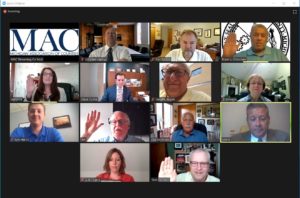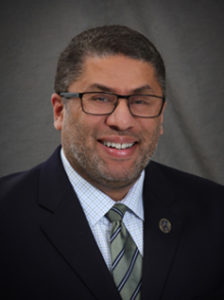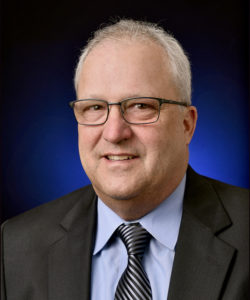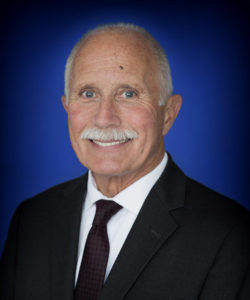By: Dan Papineau, Director of Tax Policy and Regulatory Affairs, Michigan Chamber of Commerce
 (Editor’s note: This article originally appeared in the August edition of Michigan Counties, MAC’s bimonthly e-newsletter.)
(Editor’s note: This article originally appeared in the August edition of Michigan Counties, MAC’s bimonthly e-newsletter.)
Perhaps it was the recent remark I made about Michigan’s broken municipal finance system while testifying in front of a state legislative committee that prompted the invitation to contribute to this publication.
I agree with the nonpartisan Tax Foundation that all tax policy should be based on four cornerstone principles: simplicity, transparency, neutrality and stability. The revenue side of our municipal finance system fails in all four of these categories. This is not hard to believe since local government revenues are overwhelmingly made up of property taxes. County governments depend on property taxes for 60 percent of their revenues. The crux of the problem behind our state’s municipal finance system is the over-reliance on property taxes. When we think about property taxes through the lens of the four principles of sound tax policy, we see why.
Simplicity
Since 1893, Michigan has had an ad valorem property tax system that relies on the current value of a subject property. Assessing a value to every piece of real property and all nonresidential personal property is no easy (or simple) task.
While the practice of assessment and appraisal has evolved into a complex science over the last 127 years, it is still a relatively subjective process. This subjectivity erodes simplicity. Both taxpayers and local units of government see this problem play out far too frequently in the form of property tax disputes that end up in court wasting the time and resources of everyone involved.
Property taxes can be looked at as a fair way to spread the cost of local government services across varying portions of the population but, our system has become so complicated and hamstrung by a plethora of minor tweaks and/or major deviations that our property tax system is caving in on itself. The mechanism that brings in the most significant portion of revenues county governments need is about as simple as the internal workings of the human brain.
Transparency
With increased accessibility to BS&A and other technologies, the principle of transparency has been greatly bolstered but, the process of assessment to state equalization is anything but transparent.
While summary appraisal record cards are available online either through free access or paid access, the level of detail made available lacks full transparency. For example, the building valuation work up, land value tables, economic condition factor tables and supporting studies are not available unless a Freedom of Information Act request is filed. Even the body that audits the entire property tax system, the State Tax Commission, does not share the results of their audits with the public.
Neutrality
The principle of tax neutrality is summarized as follows: “Taxes should neither encourage nor discourage personal or business decisions”. The fact is the property tax system Michigan imposes today does the exact opposite. The property tax system is actually designed to influence the decisions businesses make and to a lesser degree, the ones individuals make.
Property taxes have been used to compete for investment across local units of government and between states. Much of the policy that promotes this behavior is not within the control of the governing body of the local unit.
Policy-makers at all levels use the property tax system to encourage or discourage different behaviors. Michigan has a few parameters to promote neutrality, but they are so ineffective they are practically nonexistent.
Stability
By nature of its design, the property tax is unstable.
First, the personal property tax is based on depreciating value. It is literally designed to go down and therefore be anything but stable. Real property tax revenues or the values of which they are based on, while not as heavily affected by depreciation, are constitutionally prohibited from increasing beyond a certain level after being allowed to decline without restriction. Stable on the way back up but not down.
Second, value itself is not stable. A property worth a certain amount one day could be worth half the next. Our economic cycle contains peaks and valleys not a flat line of prosperity.
Third, policy-makers are constantly rearranging the property tax system to address its numerous faults; however, the never-ending alterations result in instability and effect budgets of police departments, public works departments and general fund spending of county governments everywhere.
Fixing the revenue side of our municipal finance system is extremely difficult while decrying its faults is easy. I respect those who dedicate their careers to finding ways to improve the system we have. We really must look at local government revenue from a completely new perspective. I believe this starts with revamping the complete service delivery method our state is currently straddled with. My friends at MAC hear me say often that county government is the best form of government. Counties should be the ones administering practically all of the services a citizenry relies on. To transfer to this type of service delivery model we must also permanently address the compounding debt burden facing counties across Michigan. Lastly, we can discuss opportunities to reinvent the property tax system (or scrap it) and create a more diverse revenue stream for local units of government to depend on.
 MAC’s Podcast 83 team will lead a special live edition on Monday, Sept. 21 to field questions from county leaders on the FY21 state budget and all other legislative matters coming to a head in Lansing this fall.
MAC’s Podcast 83 team will lead a special live edition on Monday, Sept. 21 to field questions from county leaders on the FY21 state budget and all other legislative matters coming to a head in Lansing this fall.
 Legislation to extend the authority of trial courts to levy costs to defendants will soon be law, after the Senate this week approved
Legislation to extend the authority of trial courts to levy costs to defendants will soon be law, after the Senate this week approved  A new report
A new report The seventh in an ongoing series of webinars co-sponsored by MAC and the Michigan Treasury will be held on Sept. 8, starting at 2 p.m.
The seventh in an ongoing series of webinars co-sponsored by MAC and the Michigan Treasury will be held on Sept. 8, starting at 2 p.m. A new effort by the state Health and Human Services Department (DHHS) to create a “roadmap” for health information technology will include a series of 16 virtual engagement sessions on a variety of topics such as care coordination, racial disparities in health, coronavirus response, and behavioral health. The sessions get under way on Sept. 15 and will continue into November.
A new effort by the state Health and Human Services Department (DHHS) to create a “roadmap” for health information technology will include a series of 16 virtual engagement sessions on a variety of topics such as care coordination, racial disparities in health, coronavirus response, and behavioral health. The sessions get under way on Sept. 15 and will continue into November. Staff picks
Staff picks (Editor’s note: This article originally appeared in the August edition of Michigan Counties, MAC’s bimonthly e-newsletter.)
(Editor’s note: This article originally appeared in the August edition of Michigan Counties, MAC’s bimonthly e-newsletter.) Replacement dollars for the cancelled August revenue sharing payments will reach county accounts on Monday, Aug. 31 as scheduled, MAC was told this week by state officials. Although the amount listed on the SIGMA website is correct, the name of the municipality is wrong, and is a glitch that if fixed will cause more problems than it fixes.
Replacement dollars for the cancelled August revenue sharing payments will reach county accounts on Monday, Aug. 31 as scheduled, MAC was told this week by state officials. Although the amount listed on the SIGMA website is correct, the name of the municipality is wrong, and is a glitch that if fixed will cause more problems than it fixes. MAC concluded its 2020 Virtual Annual Conference this week with members easily approving policy platforms for the coming year and the election of unopposed candidates for five Board positions.
MAC concluded its 2020 Virtual Annual Conference this week with members easily approving policy platforms for the coming year and the election of unopposed candidates for five Board positions. The Urban Institute
The Urban Institute The Great Lakes PFAS Summit
The Great Lakes PFAS Summit Crenshaw
Crenshaw Klinefelt
Klinefelt Ponstein
Ponstein Bonovetz
Bonovetz Schmidt
Schmidt Storey
Storey




